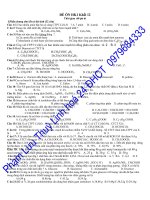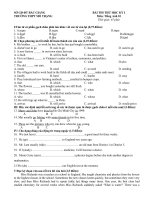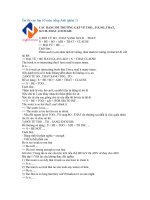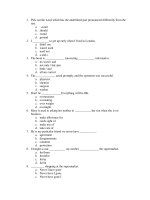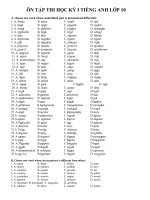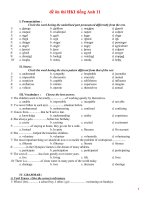Download Đề ôn thi HKI tiếng anh 10 hay
Bạn đang xem bản rút gọn của tài liệu. Xem và tải ngay bản đầy đủ của tài liệu tại đây (65.39 KB, 2 trang )
<span class='text_page_counter'>(1)</span><div class='page_container' data-page=1>
<b>Choose the word whose underlined part is pronounced differently from that of the others.</b>
<b>1.</b> A. thousand B. about C. around D. should
<b>2.</b> A. put B. produce C. calculate D. computer
<b>3.</b> A. printer B. scenic C. flight D. multiply
<b>4.</b> A. floor B. tooth C. door D. four
<b>Choose the best answer.</b>
<b>5.</b> My sister's birthday, ___________ is in June, is going to be a big celebration.
A. whom B. who C. whose D. which
<b>6.</b> A good ___________of information Technology will help you use the computer easily .
A. skill B. knowledge C. research D. expensive
<b>7.</b> After each period, we have a ___________break.
A. five minutes B. five- minute C. fifth- minute D. fifth- minutes
<b>8.</b> The synonym of “education” is ___________.
A. schooling B. scholarship C. learning D. studying
<b>9.</b> He passed the exam with high grades, ___________made everybody in the family pleased.
A. whom B. who C. whose D. which
<b>10.</b>Tom ___________. Please don’t disturb him.
A. studies B. is studying C. was studying D. has studied
<b>11.</b>When Tom arrived at the cinema, the film ___________.
A. starts B. started C. has started D. had started
<b>12.</b>My brother ___________swimming since he was young.
A. enjoyed B. has enjoyed C. would enjoy D. was enjoying
<b>13.</b>He used ___________40 cigarettes a day but he doesn’t smoke any more now.
A. smoke B. to smoke C. to smoking D. smoked
<b>14.</b>The man ___________to your sister is my uncle.
A. is talking B. was talking C. who is talking D. talked
<b>15.</b>The doctor advised me ___________.
A. to not smoke B. not smoking C. smoke not D. not to smoke
<b>16.</b>What ___________at this time yesterday?
A. did you do B. you did C. were you doing D. had you done
<b>17.</b>He ___________to his parents recently.
A. writes B. wrote C. has written D. was writing
<b>18.</b>___________his mental illness, the boy can’t keep pace with his classmates.
A. Although B. Despite C. Because D. Because of.
<b>19.</b>A well- ___________child often behaves quite differently from one who did not get good schooling.
A. educate B. education C. educating D. educated
<b>20.</b>Although he coughed badly, he ___________no effort to stop smoking.
A. make B. do C. made D. has
<b>Identify the mistake in each sentence by circling letter A, B, C or D</b>
<b>21.</b>We used to going fishing on this river when we were small children.
A B C D
<b>22.</b>We enjoy stay at home to watch TV in the evening.
A B C D
<b>23.</b>Before I went to bed last night I have already finished my homework.
A B C D
<b>24.</b>My house has painted since last Tuesday .
A B C D
<b>25.</b>My daughter was particular impressed by the dancing.
A B C D
</div>
<span class='text_page_counter'>(2)</span><div class='page_container' data-page=2>
Have you ever visited London, one of the most famous cities in the world? London is divided into
three parts, The City, the West End and the East End. The City is Britain’s commercial and banking
center. The West End is the part where rich people live. The East End is the part where poor people live.
Lenin visited London before the Great October Socialist Revolution. He often came to work at the
British museum. He gathered material for his works. Lenin studied the life of the British workers and
British labour movement. He attended meetings and gatherings. He spent much time in learning English
in order to master it. Lenin liked to walk around the city to learn more about the British capital. He called
London the city of striking contrasts.
<b>26.</b>London is one of the ___________cities in the world.
A. poorest B. smallest C. most famous D. biggest
<b>27.</b>How many parts is London divided into?
A. 2 B. 3 C. 4 D. 5
<b>28.</b>When did Lenin visit London?
A. Before the October Revolution. B. After the October Revolution.
C. During the October Revolution. D. At the beginning of the October Revolution.
<b>29.</b>Lenin liked to walk around the city to ___________.
A. learn English B. know more about the British capital
C. have a sightseeing tour D. go shopping
<b>30.</b>Lenin called London the city of ___________.
A. fame B. the rich Londoners C. The poor Londoners D. striking contrasts
<b>Fill in each numbered blank with one suitable or phrase.</b>
Nowadays lots of people drive to large supermarket to (31)___ their shopping. These
supermarkets have car-parks, so you can buy several (32) ___ of shopping. You can fill your trolley, and
(33) ___ put it to your car. Some people prefer to go to local shops. These small shops are usually (34)
___ than supermarkets. Some towns have an open air market in the center, (35) ___ you can buy fruit and
vegetables, but you have to carryyour shopping home.
<b>31.</b>A. make B. take C. have D. do
<b>32.</b>A. shops B. bags C. pockets D. customers
<b>33.</b>A. then B. first C. second D. after
<b>34.</b>A. cheaper B. cheap C. expensive D. most expensive
<b>35.</b>A. which B. who C. where D. whom
<b>Choose the sentence that has the same meaning as the original.</b>
<b>36.</b>They are going to hold next year’s congress in San Francisco?
A. Next year’s congress are going to be held in San Francisco?
B. Next year’s congress is going to be held in San Francisco?
C. Next year’s congress are going to hold in San Francisco?
D. Next year’s congress is going to hold in San Francisco?
<b>37.</b>Mary is lazy. This makes her parents sad .
A. Mary is lazy, which makes her parents sad. B. Mary is lazy that makes her parents sad.
C. Mary who is lazy makes her parents sad. D. Mary is lazy which makes her parents sad.
<b>38.</b>This is the first time I have met him.
A. I have never met him before. B. They have met him recently
C. I have met him many times D. I want to meet him.
<b>39.</b>Jane finds it difficult to drive on the left.
A. Jane is not used to driving on the left B. Jane is not used to drive on the left
C. It’s difficult for Jane to drive on the left D. Both A and C are correct
<b>40.</b>I sent a letter, then I came here.
A. Before I come here, I had sent a letter. B. Before I came here, I sent a letter.
C. Before I came there, I had sent a letter. D. Before I come here, I had send a letter.
</div>
<!--links-->
